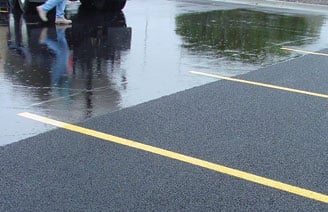Business Parking Lot Paving: Transforming Areas with Hot Mix Asphalt
Business Parking Lot Paving: Transforming Areas with Hot Mix Asphalt
Blog Article
Exploring the Ecological Benefits of Hot Mix Asphalt
The utilization of Warm Mix Asphalt in facilities tasks offers a compelling case for sustainable growth and ecological stewardship. By diving into the elaborate details of its production processes and the cutting-edge use recycled materials, a much deeper understanding emerges of how this innovation goes beyond simple surface applications. The ecological benefits of Warm Mix Asphalt expand much beyond first perceptions, supplying a nuanced viewpoint on how this material can lead the way for a greener future.

Lowered Greenhouse Gas Emissions
The manufacturing process of Hot Mix Asphalt entails warming the combination of aggregate and asphalt binder to high temperatures. By including reclaimed asphalt pavement and recycled asphalt roof shingles right into the mix, the requirement for virgin materials is reduced, leading to energy financial savings and reduced exhausts linked with extraction and handling.
Studies have shown that Warm Mix Asphalt sidewalks have a smaller sized carbon impact over their life process compared to various other pavement choices. The toughness and recyclability of Warm Mix Asphalt additionally enhance its ecological advantages by lowering the demand for regular maintenance or replacement, thus saving resources and lessening exhausts connected with restoration activities.
Energy Efficiency and Conservation
The manufacturing procedure of Hot Mix Asphalt not just lowers greenhouse gas exhausts yet also adds considerably to energy effectiveness and preservation efforts. Energy performance is a vital benefit of Hot Mix Asphalt production contrasted to various other sidewalk types. The process entails heating up the materials at heats to produce the asphalt mix, which needs less power than alternate methods. Furthermore, the ability to reuse and reuse asphalt sidewalk additionally enhances power preservation. By including reclaimed asphalt pavement (RAP) right into new blends, the industry saves power that would certainly have been required to create entirely brand-new products. The durability of Warm Mix Asphalt minimizes the regularity of maintenance and repair, leading to lasting energy financial savings. This longevity decreases the energy-intensive processes included in regular fixings and replacements. In General, Warm Mix Asphalt stands out as an ecologically friendly choice that prioritizes power effectiveness and preservation throughout its lifecycle.
Lasting Pavement Solutions

One key aspect of sustainable sidewalk remedies is making use of recycled materials such as recovered asphalt pavement (RAP) and recycled asphalt shingles (RAS) By integrating these products right into the asphalt mixtures, the demand for virgin sources is lowered, resulting in reduced power consumption and greenhouse gas discharges during production. Furthermore, the reuse of these products aids draw away waste from land fills, adding to a much more round and lasting economic climate.
Moreover, sustainable sidewalk services focus on maximizing sidewalk layout to improve efficiency and long life. Techniques such as warm mix asphalt (WMA) and stone mastic asphalt (SMA) boost the toughness and strength of sidewalks, minimizing the demand for regular fixings and replacements. By applying these ingenious strategies, infrastructure designers can create sidewalks that not just meet high-performance criteria yet read the full info here likewise lessen their environmental impact.
Minimized Environmental Influence
Hot mix asphalt, in specific, uses a number of advantages that contribute to reducing the general ecological footprint of road facilities. One key facet is the recyclability of asphalt, which can be reused several times without jeopardizing its high quality - Regrading.
In addition, the manufacturing of hot mix asphalt produces reduced degrees of greenhouse gases contrasted to other sidewalk read more materials, making it a more eco-friendly alternative. The energy effectiveness of asphalt plants has additionally boosted throughout the years, leading to reduced gas intake and lower emissions. In addition, the smooth surface area of hot mix asphalt lowers rolling resistance for cars, resulting in reduced gas usage and decreased air pollution from vehicle exhausts.
Payment to Climate Adjustment Mitigation
Warm mix asphalt plays an important duty in mitigating climate adjustment through its sustainable homes and decreased ecological impact. One considerable payment to environment change reduction originates from the power efficiency of warm mix asphalt manufacturing. Compared to other pavement alternatives, the manufacturing process for hot mix asphalt consumes much less power and produces reduced degrees of greenhouse gases, hence decreasing its total carbon footprint.
In addition, hot mix asphalt's capacity to show sunlight, called albedo, helps in minimizing city warm island effects. By lessening heat absorption and retention, hot mix asphalt sidewalks can lower the need for cooling in city areas, consequently lowering greenhouse gas discharges associated with power usage for cooling down purposes.
Additionally, the durability and recyclability of warm mix asphalt better improve its environment modification reduction capacities. Regrading. The lengthy life-span of asphalt sidewalks minimizes the demand for constant repairs or replacements, ultimately decreasing the carbon exhausts connected to road maintenance tasks. The see post recyclability of asphalt materials decreases the need for virgin resources and lowers the environmental influence of sidewalk construction, straightening with sustainable techniques for environment adjustment reduction.
Final Thought
In verdict, the environmental advantages of Warm Mix Asphalt show its substantial payment to lowering greenhouse gas exhausts, conserving power, and lessening environmental impact. This lasting pavement service lines up with climate change mitigation initiatives, promotes source conservation, and boosts facilities advancement. By utilizing recycled products, energy-efficient production procedures, and sturdy style, Warm Mix Asphalt plays an important duty in cultivating a much more ecologically friendly technique to facilities building.
The production process of Warm Mix Asphalt entails heating up the mixture of aggregate and asphalt binder to high temperature levels. By integrating redeemed asphalt sidewalk and recycled asphalt tiles right into the mix, the need for virgin products is lowered, leading to energy financial savings and lowered emissions connected with extraction and handling.
One secret element of sustainable sidewalk remedies is the usage of recycled materials such as recovered asphalt sidewalk (RAP) and recycled asphalt shingles (RAS) Techniques such as cozy mix asphalt (WMA) and stone mastic asphalt (SMA) improve the sturdiness and durability of pavements, minimizing the requirement for constant repair services and substitutes. Compared to various other pavement alternatives, the production process for warm mix asphalt eats less power and releases lower levels of greenhouse gases, thus minimizing its general carbon impact.
Report this page